Fri 23 Feb 2007
Interview with JOHN “WADE” WRIGHT
Posted by Steve under Authors , Crime Fiction IV , Interviews , Old Time Radio[5] Comments
After learning more about John’s career and his interests and background in a good many fields, I asked if he’d care to answer a few questions about himself, and he graciously agreed. I formulated the questions, Bill added two or three of his own, and we sent them off to John. The result of all this is what follows. –Steve
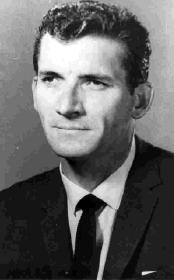
John Wright about the time that
Shadows Don’t Bleed was written.
Q. Thanks for taking the time to talk to us about your career. Unfortunately (and correct me if I’m wrong) none of the mysteries have been published in the US. I’ll begin therefore with a list of all of the titles Al Hubin has for you in his bibliography of the field, Crime Fiction IV:
* Blood in the Ashes (n.) Hale 1964 [Bart Condor]
* A Hearse Waiting (n.) Hale 1965 [Bart Condor; New York City, NY]
* Until She Dies (n.) Hale 1965 [Bart Condor; California]
* Blonde Target (n.) Hale 1966 [Bart Condor; New York City, NY]
* Shadows Don’t Bleed (n.) Hale 1967 [Paul Cameron; California]
* The Sharp Edge (n.) Hale 1968 [Paul Cameron]
* No Haloes in Hell (n.) Hale 1969 [Paul Cameron]
* Two Faces of Death (n.) Hale 1970 [Bart Condor]
* Don’t Come Back! (n.) Hale 1973 [Calhoun]
* The Hades Hello (n.) Hale 1973 [Paul Cameron; Los Angeles, CA]
* It Leads to Murder (n.) Hale 1981 [California]
* Death at Nostalgia Street (n.) Hale 1982 [New England]
* The Girl from Yesterday (n.) Hale 1982 [Calhoun; U.S. Midwest]
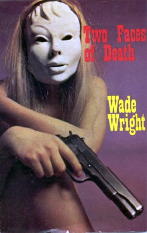
I have a confession to make. While Bill has many of your books and has read them, at the present time I don’t have any of them, or if I do, I don’t have access to them. I’ll defer to you to tell us something about them. I’m going only by the titles, but I’m willing to guess that both Bart Condor and Paul Cameron are private eyes. How close am I?
A. As close as you can get. Condor was the first, and there is no doubt at all I’d been influenced by Mickey Spillane and his Mike Hammer. In fact, it was probably Mickey who really got me started.
I’d written to him, care of New American Library, to say thanks for a lot of very enjoyable reading. Mickey replied by way of a pretty long letter that ended with: “Keep writing and make lots of money.” At the time I was knocking out an occasional article or short story, but that was it.
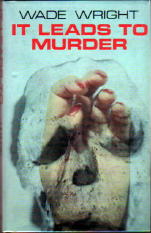
Q. Tell us more about some of the individual books?
A. I guess the “make lots of money” bit must have stuck somewhere in the thing I call a mind, because a year or so later —
I was holding down a job as General Sales Manager for a nation-wide engineering company, often putting in eleven hours a day. I’d recently married and before doing so had contracted to have a house built in a place called Western Hills, Port Elizabeth. I woke up one morning with the realization that for the first time in my life I owed money, and the feeling wasn’t at all comfortable. Even more uncomfortable was the knowledge that, though pretty good at my job, I did not enjoy working for a boss.
I’ve forgotten what it was all about, but there was a morning when I had a blow-up with my boss. At lunchtime I drove home and spent two hours hammering my Olivetti portable — completing the first two chapters of Suddenly You’re Dead. A couple of weeks later I finished it and sent it to a New York agent who felt it was marketable but needed some fixing — for a price. Declining the offer, I had the MSS sent to London International Press, a recently established firm of literary agents. They agreed to handle the work and sold it to Robert Hale Limited, whose contract included first option on the next three books.
Suddenly You’re Dead paid off the mortgage on the house.
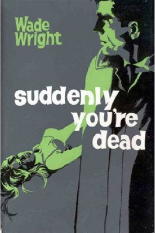
Like most everything else that followed it was written with an eye on the clock. Working in the engineering, construction, and contracting fields has created a habit of measuring everything terms of time, material and reward. Usually a book was written at the rate of a chapter a night, sometimes more, and seldom consecutively. Often I’d be away from home, not able to get back to my desk for days. Perhaps, had conditions been different, had I devoted more time to them, the books may have been a little better than they are. But that’s water under the bridge and I take the rap for everything.
I hated the hypocrisy of the business world, the brown-nosing and backstabbing, and quit some 30 years ago. After doing so the Company asked that I consider the post of a Project Specialist — a fancy name for trouble-shooter. I submitted a proposal, which I expected to be thrown out. It wasn’t, and I signed a six-month contract that had me driving or flying all over the country, and away from home from Monday morning until late Friday night. Since then I’ve been freelancing.
Q. Bill considers Death at Nostalgia Street, whose protagonist is editor of a string of movie nostalgia magazines, to be your best novel. Do you agree with him?
A. I believe Bill would be a better judge than me, so I’d have no trouble accepting his opinion. Certainly I enjoyed writing that one, possibly because I’d always been interested in the publications Nostalgia Street Enterprises handled. Then, too, I’d developed a liking for stories played out in places other than big cities.
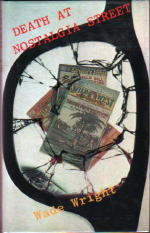
Q. When did you first start writing? And why did you sign yourself Wade Wright rather than John Wright?
A. I imagine it started in grade school. I disliked the prescribed reading the school offered, preferring comic books, pulps, Leslie Charteris, Earl Derr Biggers, and a couple of others. Frequently I’d catch hell for bringing comics or pulps to school, to trade with a couple other kids.
What I liked least of all were the essays we were required to write . . . stuff like “My Holiday On The Farm.” Most kids I knew had never seen a farm. But when an open subject was available I didn’t mind a bit. Afterwards, in spite of receiving good marks, I’d be lectured about writing of gangsters, fascist agents or spies, warned that with those sort of notions I’d very likely wind up as a delinquent, or worse.
As for the Wade Wright tag … it was chosen essentially to keep my private and business lives completely separated.
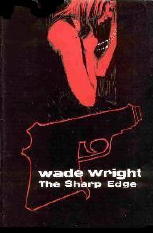
Q. You live in South Africa. Have you always lived there?
A. Most of my life. I spent two years bumming around what was then the Rhodesias — now Zambia and Zimbabwe — keeping one step ahead of the immigration authorities, working at anything to make a buck. In those days that part of Africa was often referred to as God’s Country. Everything was plentiful, and cheap. Jaguars were nearly as common as Fords! I instructed at a judo school, performed as a nightclub photographer, raced stock cars, and somehow became involved with contributing to the sports pages of a newspaper. On occasion I sold short-shorts to another weekly.
On my twenty-first birthday I woke up with a pretty bad hangover, the equivalent of $2.40 in my pocket, and not a friend in sight. Lots had to be learned the hard way.
Q. Why did you choose to set all of your mysteries in the US? Have you ever visited here?
A. Though I lived in a country that was still a colony of The British Empire, and was born from Irish and Welsh stock, I’ve always identified more with the US than Britain. Possibly early reading habits and a love of movies helped a lot. Yes, I’ve been to the States, but it was a long while ago. Always intended returning, possibly for good, but moral obligations determined otherwise.
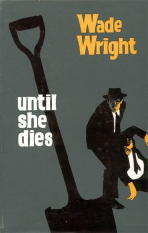
Q. What mystery writers had the most influence on you in your writing career? Do you have any favorite authors today? Are there “forgotten” writers whom you’d most like to see back in print?
A. They all had some influence, I’m sure. I was probably 14 or 15 when I found cheap hardback editions of Chandler’s The Big Sleep and Farewell My Lovely, and they steered me onto yet another path. As mentioned earlier, it was Mickey Spillane who really got me writing. But the writer I really hold in high regard is Howard “John Evans” Browne.
Of today’s writers Bill Pronzini has to be my favorite.
There are many I’d like to see back in print, especially Robert Martin, and three other authors whose books or stories have always found special places on my shelves — William Campbell Gault, Thomas B. Dewey, and Jack Finney.
Q. As I understand it, you grew up listening to the radio. What we call “old-time radio” here in the US did not last as long as it did in South Africa. Tell us about some of your favorite shows, and in particular, for those not familiar with the story, what was your part in saving the South African version of The Avengers for posterity?
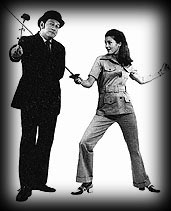
Donald Monat as John Steed and
Diane Appleby as Emma Peel —
South Africa’s Avengers.
A. Early days of South African radio were fashioned after the style set by the BBC -– British Broadcasting Corporation — so for a long while, for me, a radio was but another piece of furniture. Then, one night I heard these mysterious voices and perhaps a scream, and for the first time gave the radio real attention. I’ve no idea what the show was, but a jaded memory suggests it might well have been an adaptation of Edgar Wallace’s Grey Face. But it wasn’t until the introduction of commercial radio, by way of Springbok Radio, that I really began to enjoy the medium.
The reason is easy to explain. Years earlier I’d found three back issues of the American magazine Radio Mirror on sale at Woolworth’s for 5 cents each. (Still have them.) Those magazines contained articles about the Grand Ole Opry, Perry Mason, Dr. Christian … the logs listed The Shadow, The Fat Man, Box 13 … That, I figured, was radio.
Springbok Radio offered many of those shows, Bold Venture, Richard Diamond — and the likes of Nightbeat, The Hidden Truth, and Superman, canned in Australia. And, of course, the soaps.
I’d started recording these shows and trading them with American OTR collectors. Along the way I came in contact with a legally blind fellow in New York who was anxious to secure copies of The Avengers, a locally produced radio series based on the British TV series. I had no idea then that a number the shows I recorded would turn out to be the only copies saved on tape. Since then a great many South African shows I recorded and traded have turned up in the lists of OTR dealers.
Q. You were also involved with early comic book fandom. How did that come about?
A. The day my older sister brought home a copy of Superman #4. I was immediately hooked; afterwards devouring any (American) comic book I could get my hands on. A consequence of this was that I could read a little before starting school, and that forever after, most required reading matter would seem tame and boring.
I never knew his name then, but Joe Simon’s work on Blue Bolt, really grabbed me. A long time later I’d discover his Captain America, Stuntman, Boys Ranch, and other features. Instinctively, I always believed that he, Joe Simon, was the creator of Captain America, but it was not until the release of his book, The Comic Book Makers, that I found this to be fact.
And it was Joe Simon who introduced me to Comics Fandom. I’d stumbled across his name in Writer’s Market, listed as editor of Sick, and wrote to him, asking if he were the Joe Simon who’d produced so much truly great stuff for the comics. Indeed he was, and not only did he provide an immediate reply, he also sent sample copies of Sick. It so happened that my letter had arrived within a short time of him receiving the first issue of Alter Ego, the first of the comics’ fanzines.
Mr. Simon thought I’d be interested and provided the address of the publisher, Dr. Jerry G. Bails, who passed away in November 2006, at the age of 73. Jerry also wasted no time in contacting me and shooting across the debut issues of his fanzine. The manner of production — printed on a Ditto Duplicator — intrigued me. We had such a machine in the office, but as far as I was concerned it was strictly for printing inter-office notices or price lists. I got hold of a master and a few sheets of duplicating carbon, knocked out a cover and for lack of a better name titled it The Komix.
The cover came out pretty well. But now, with 200+ copies printed there seemed to be a need for a story to fit it. Eventually I had about 40 pages to staple together into a fanzine. What I didn’t know was that it would the first comics fanzine to be published outside of the US. Nor that on eBay copies of the second issue would one day sell for as much as $70.00 each.
I published only two issues of The Komix, had planned a third, but pressure of work was really cutting into my time. Often I’d be in four major cities in the same week. And then Suddenly You’re Dead was sold and I was committed to produce more.
Q. Tell us about your series of Western novels published as by Ray Nolan?
A. These were started when my publisher opted to quit mysteries. Like most boys I loved the B-Westerns. Also the pulps such as Fifteen Story Western, Dime Western, Texas Rangers, etc. So the transition wasn’t difficult and I enjoyed doing them. What I didn’t enjoy was an editor trying to maintain political correctness, oft times even endeavoring to eliminate references, which might be considered even remotely offensive.
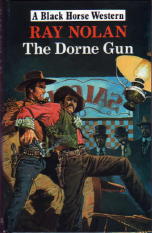
The pseudonym, by the way is derived from two men I have always greatly admired. My friend, singer songwriter and actor, the late Ray Whitley, and the legendary Bob Nolan, who penned such Western classics as “Tumbling Tumbleweeds”, “Cool Water”, and so many others.
Q. You’ve done quite a few radio scripts for South African radio and short fiction for S.A. publications. Name some of the programs you’ve written for and the magazines in which you’ve been published. Did you find short stories and radio scripts easier to write than novels?
A. Writing for radio was fun — and lucrative. I’d tried years back to break into the medium but it was something of a closed club. Finally I gave up. About 30 years ago, at a time when all shows on commercial radio were from local production houses, I happened to listen to a particular show and while doing so came up with a story idea. Next day I hacked it out and sent it to Springbok Radio’s head office. There, a fellow named Ben Swart, was good enough to write and tell me that the series was contracted and did not accept outside contributions. He had, however, taken the liberty to send my script to André Bothma, a producer operating in Cape Town. André bought it and asked for more, and soon a very enjoyable relationship was established, though I never ever met him or attended any recording session.
The real break came when André phoned to say he’d like me to write for The Deciding Factor, a 45-minute show that aired on Sunday nights and attracted more listeners than any other. Could I start off with three scripts? He suggested themes for two and left the third for me to choose.
“When will you need them?” I asked.
“Oh, by next Friday will be fine.”
And that’s how it went. I wrote about 200 scripts for The Deciding Factor, Suspense, Radio Theatre, Tuesday Theatre, and others. Contracts were more than extremely fair. Fees continually rose, and they covered two broadcasts within a period of 14 days. If a show was again aired after that period the writer was paid 50% of his current fee.
André was an innovator and one of the best in the business. Never afraid to stick his neck out he’d try anything, and we had fun using werewolves and banshees, and even stories like Charley’s Amazing TV Set. Good times. Fun times.
The first two stories I ever wrote and sold were to a new magazine titled Yours. It boasted the worst covers I have ever seen on any magazine. I was 15 at the time, but already working. Unfortunately neither were published because Yours went belly-up. Ten years afterward, or perhaps even later, I found one of the stories, changed the name from “Ain’t Nobody Honest?” to “Stopover At Nathan,” and a British agent sold it to London Mystery Magazine. It was subsequently reprinted, but I no longer have any record of it.
When we sold our home at Bluewater Bay, a number of cartons got “lost” in moving, among them recorded tapes of the radio shows for which I’d written, manuscripts, and lots of personal and valued correspondence.
Other stories have appeared in such local slicks as Family Radio & TV, Fair Lady, You … feature articles in Weekend Post, Leisure, etc – usually under other pseudonyms. Articles on show business personalities have been published in the US, in Under Western Skies, Nemesis, Screen Thrills, Classic Images, and possibly others.
I’ve found scripting for radio the easiest. Usually I could get a story finished in a day. It was also less hit-and-miss than writing for magazines. The entire manner of conducting business was also completely professional. Acceptances were fast, and your check arrived within 30 days. The downside of it was that often the broadcast sounded nothing like the sounds heard in one’s head when pounding the typewriter.
Q. Overall, what’s given you the most pleasure in your writing career?
A. The work and the people with whom it has brought me in contact. Most gratifying has been to find that those of real substance are invariably the most down to earth.
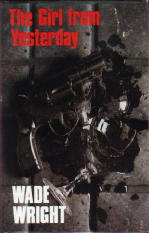
—
SHORT STORY BONUS. I’ll let John set the stage:
A tale’s attached to this short.
A colleague asked me about plotting, and while explaining what I did, worked out a complete plot for him – based upon his habit of visiting the pub in question. He never used it, which was no surprise.
On a Sunday morning some months later, I remembered the thing, made a few changes, and put it on paper … with no idea what I’d do with it. The very next week I received a letter from a friend — possibly Bill — telling me about the new Black Mask, suggesting I might think of sending them something.
I sent “Waiting,” and they bought it right away. But then they shut down but paid a kill fee, returning all rights. Later still it was accepted by Black Lizard, but I heard no more from that end. Maybe I should have followed up.
Anyway, though it has earned some good money, the story has never yet seen print. If you find it the least bit interesting, you’re free to link it to your site.
UPDATE [02-24-07] Four additional cover scans have been added since the interview was first posted.
February 27th, 2007 at 3:17 pm
Considers my cockles warmed. I live for this stuff.
And if John has a P.I. story he doesn’t know what to do with, well, he can drop me a line.
February 28th, 2007 at 8:03 pm
[…] 28 Feb 2007 WADE WRIGHT’s Private Eye Characters Posted by Steve under Authors , Characters Following the interview withJohn “Wade” Wright here not too long ago, I’ve been asked to say some more about his recurring characters. (Preceding the interview is a list of all 14 of his mystery novels.) […]
March 9th, 2007 at 10:12 pm
[…] Delighted first of all because, as you may recall, John “Wade” Wright was interviewed here not too long ago. These will be the first US editions of any of his novels. It’s been a long wait, but it shouldn’t be too much longer. And if more are coming, as Fender seems to suggest, then all the better. […]
June 7th, 2007 at 4:19 am
I FOUND THIS ARTICLE WHILST SEARCHING THE WEB FOR SPRINGBOK RADIO.
WHAT INTRIGUED ME WAS THE REFERENCE TO WADE WRIGHT WHOM I BELIEVE IS A COUSIN OF MY MOTHER AND WHOM I HEARD ABOUT AS A CHILD AND RECALL READING SUDDENLY YOURE DEAD. UNFORTUNATELY I DONT REMEMBER THE STORY SO I WILL HAVE TO REVIST WADE AS AN AUTHOR. I HAD NO IDEA WADE PLAYED SUCH AN IMPORTANT ROLE IN A WRITING FOR SPRINGBOK RADIO AS WELL AS HELPING TO PRESERVE MANY OF THE OLD PROGRAMMES.
THANKS FOR REKINDLING OLD MEMORIES
REGARDS
IAN MEGOM
BRISBANE AUSTRALIA
November 15th, 2008 at 12:52 pm
[…] received some sad news this morning. John Wright, a mystery writer living in South Africa whom I interviewed here on the blog back in February 2007, has passed […]